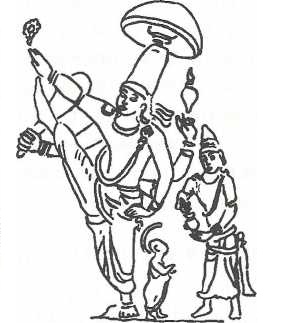Talk:Trivikrama (‘one with three steps’)
From Hindupedia, the Hindu Encyclopedia
created three fundamental elements out of himself. They are: tejas (fire), āpa (water) and anna (earth). These three are the pure elements imperceptible to the senses. Brahman then created the gross elements out of these, by the process of trivṛtkaraṇa or triplication. In this, half of one subtle or sukṣma element is combined with one-fourth of the other two, resulting in the gross (sthula) element as follows: (subtle) tejas | + (subtle) āpa | + (subtle) anna | = gross or sthula tejas. This is technically called trivṛtkaraṇa. The process is similar to that of pañcikaraṇa. See PAÑCĪKARANA.

